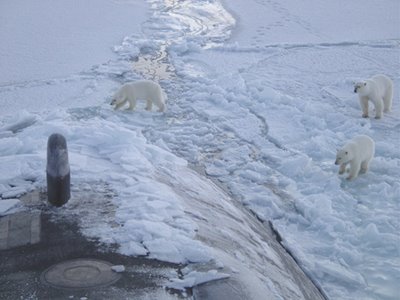 We have all heard the cries of global warming. We have all heard that green house gasses are causing the Earth’s temperature to rise and this is in turn melting the polar ice caps and that this could be devastating. We have all heard it but is it true? Lets take a closer look…
We have all heard the cries of global warming. We have all heard that green house gasses are causing the Earth’s temperature to rise and this is in turn melting the polar ice caps and that this could be devastating. We have all heard it but is it true? Lets take a closer look…“Polar ice sheets show net loss,” says the headline. However, if you take timeto read the full article, you may come away with a totally different conclusion.
According to an article published on BBC online (9 Mar 06), melting glaciers areadding 20 billion tons of water to the oceans each year. The discovery came after a team headed by Dr H. Jay Zwally of NASA analyzed satellite and aircraft data. “The survey documents extensive thinning of the West Antarctic ice shelves,” the article says, “but a thickening in the East of the continent, though not by as much as some other studies have shown.”
NOTE: What the article fails to mention is that West Antarctica is only one tenth the size of East Antarctica . In other words, the ice is growing thicker across 90% of Antarctica .
The study also shows, the article continues, that the interior of Greenland is gaining mass due to increased snowfall, but the edges are getting thinner. NOTE: Read that again. The interior of the Greenland Ice Sheet is gainingmass, not losing mass.
But rising temperatures could have the opposite effect at the edges of bothlandmasses, the story says, causing rates of melting to increase.
NOTE: It doesn’t say that it is having the opposite effect, just that it could. That is a Big – Big difference.
"A race is going on in Greenland between these competing forces of snowbuild-up in the interior and ice loss on the edges," explained Dr Zwally.
"But we don't know how long they will be approximately in balance with eachother, or if that balance has already tipped in favor of the recently accelerating outflow from glaciers."
NOTE: "We don’t know,” says Zwally. Come on, that is hardly a definitive statement.
"The study indicates that the contribution of the ice sheets to sea-level rise during the decade studied was much smaller than expected,” said Zwally, “just two percent of the recent increase of nearly three millimeters a year."
NOTE: Dr Zwally confirms that sea levels are rising by less than three millimeters per year. That's about 1/10th of an inch. At that rate, it would take 100 years for sea levels to rise 10 inches. But remember, Zwally says that only two percent of that increase comes from melting glaciers. (Apparently 20 billion tons is not all that much when you look at the size of the world’s oceans.) According to simple calculations, two percent of 10 inches works out to be two inches of sea level rise every one thousand years. I don’t think I’ll stay awake nights worrying about this. Actually, considering that sea levels have risen some 370 feet (121 meters) since the end of the last ice age ( 3.7 feet per 100 years), it would appear that the trend is reversing. In fact, with the ice build-up in East Antarctica, I think sea levels are already beginning to fall. And I’m not alone in this. A group of scientists under the leadership of Professor Nils Axel Morner has found that sea levels in the Maldives in the Indian Ocean have been falling for the past 30 years.
Well there you have it. I think that the Earth is just going thru a normal cycle and nothing more. I think that the planet is far better to adapt to what we mere humans can do to it that we give it credit for. But it is still weird and part of our weird world that’s for sure!
I’m Average Joe


No comments:
Post a Comment